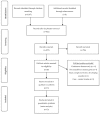Associations of Maternal Vitamin D Deficiency with Pregnancy and Neonatal Complications in Developing Countries: A Systematic Review
- PMID: 29783717
- PMCID: PMC5986519
- DOI: 10.3390/nu10050640
Associations of Maternal Vitamin D Deficiency with Pregnancy and Neonatal Complications in Developing Countries: A Systematic Review
Abstract
Pregnant women in Asia, the Middle East, Africa and Latin America are at risk of vitamin D deficiency (VDD) and prevalence throughout these regions are among the highest, globally. Maternal VDD has been associated with increased risk of a number of adverse maternal and neonatal health outcomes, yet research from developing countries is limited. We assessed the associations of maternal VDD during pregnancy with adverse health outcomes by synthesizing the literature from observational studies conducted in developing countries. Six electronic databases were searched for English-language studies published between 2000 and 2017. Thirteen studies from seven countries were included in the review. Prevalence of VDD ranged from 51.3% to 100%. Six studies assessed both maternal and neonatal outcomes, four studies assessed only maternal outcomes and three studies assessed only neonatal outcomes. Ten studies showed at least one significant association between VDD and adverse maternal and/or neonatal health outcomes including pre-eclampsia (n = 3), gestational diabetes mellitus (n = 1), postpartum depression (n = 1), emergency cesarean section delivery (n = 1), low birth weight babies (n = 4), small for gestational age (n = 2), stunting (n = 1). However most of these studies (n = 6) also showed no association with multiple health outcomes. Vitamin D assessment methods, criteria applied to define VDD, season and trimester in which studies were conducted varied considerably across studies. In conclusion, this study highlights the need to improve maternal vitamin D status in developing countries in an effort to support best maternal and child health outcomes across these regions. Future research should focus on more unified approaches to vitamin D assessment and preventative approaches that may be embedded into already existing antenatal care settings.
Keywords: developing countries; gestational diabetes mellitus; low birth weight; maternal; neonatal; obstetric; pre-eclampsia; pregnancy; small for gestational age; vitamin D.
Conflict of interest statement
The authors declare no conflict of interest.
References
-
- Holick M.F., Binkley N.C., Bischoff-Ferrari H.A., Gordon C.M., Hanley D.A., Heaney R.P., Murad M.H., Weaver C.M. Evaluation, treatment, and prevention of vitamin D deficiency: An endocrine society clinical practice guideline. J. Clin. Endocrinol. Metab. 2011;96:1911–1930. doi: 10.1210/jc.2011-0385. - DOI - PubMed
-
- Kiely M.E. Invited commentray: Further evidence that prevention of maternal vitamin D deficiency may benefit the health of the next generation. Br. J. Nutr. Diet. 2016;116:573–575. - PubMed
-
- World Health Organisation . Vitamin D. Vitamin and Mineral Requirements in Human Nutrition: Report of a Joint FAO/WHO Expert Consultation. 2nd ed. WHO; Geneva, Switzerland: 2003. Chapter 3.
Publication types
MeSH terms
LinkOut - more resources
Full Text Sources
Other Literature Sources
Medical


